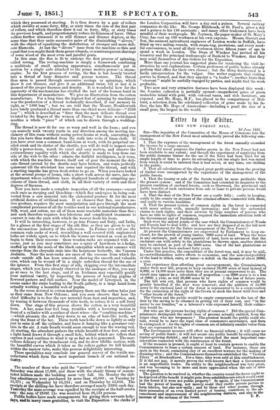utter to t4r Chant
THE NEW FOBEST BILL. 2d Jane 1851.
Sri—The inquiries of the Committee of the House of Commons into the management of the New Forest most satisfactorily proved the following con- clusions. 1. That the expenses of the management of the forest annually exceeded the income by a large amount. 2. That for naval purposes the timber grown in the New Forest had not been available to any extent; and though the experiment of supplying from the public domains timber for the use of the Navy had been tried for an ample length of time to prove its advantages, not one single fact was stated from which it could be inferred that it had saved, at any time, one shilling to the public. 3. That all calculations of the alleged great profit arising from the growing of timber were unsupported by the experience of the management of the public forests. 4. That the leasing or sale of the forests would be more profitable than the present system : and if the Committee had extended its inquiries to the present condition of enclosed forests, such as Sherwood, the provincial and public benefits of such enclosures from sale or lease to private persons would have been distinct.
5. That the deer of the New Forest are a costly folly ; costly in keeping, costly to the county on account of the criminal offences connected with them, and costly to various localities.
6. That the resent system of common rights in the forest is connected with many serious evils, annually increasing; and that the unfounded claims to such rights, and their exercise by large numbers of persons who have no title to rights of common, required the immediate attention both of the Government and of Parliament. Such were the salient points of the case which the Commissioners of Woods and Forests had to deal with; and how are they disposed of in the bill now before Parliament for the future management of the New Forest? At present the Commissioners are empowered by Parliament to keep en- closed, for the growth of young timber, 6000 acres of land. When the trees in any enclosure, part of this quantity of land, have so advanced that the enclosure can with safety to the plantations be thrown open, another district may be enclosed as part of the 6000 acres. One of the last plantations ao thrown open had been enclosed forty years. Under this practice, the expenditure of the forest was, and, it may be said, is—notwithstanding active efforts to economize, and the non-chargeability of the land to tithes, rates, or taxes—a deficit on the income of about NO01 a year. Past experience thus affording great encouragement, the Commissioners, under their new bill, propose to keep enclosed 20,000 acres of land instead of 6,000, or 14,000 more acres than they are at present empowered to do. The result may appear in a calculation of proportion :—as 6000 acres is to a loss of 20001. a year, so will 20,000 acres be to 1. the loss of future years. The bill seta out, that persons who have rights of common would be greatly benefited if the deer were removed; and the addition of 14,000 acres to the enclosed land of the forest is represented to be a compensation for the extinction of the right of the Crown to stock the forest with deer and "other beasts of the forest." The Crown and the public would be amply compensated in the loss of the deer by the saving to be obtained in getting rid of their cost, and "in the mercy to our families," as a labourer's wife expressed herself, their extinc- tion would be. But who are the persons having rights of common ? Did the special Com- missioners distinguish the small class of persons actually entitled, from the larger class who are trespassers ? The greatest benefit the public could ob- tain, would be to have the legal class of commoners ascertained, and then to extinguish it : for the rights of common are of infinitely smaller value than they are represented to be. The Government measure will effect no financial reform ; it will cause no saving of public funds ; it will not secure any public benefit by enlarging the timber-growing district ; and it leaves untouched the moat important con- siderations connected with the continuance of the forest. If the measure is pressed, it ought at least to contain powers to enable the Commissioners to lease a certain amount of land. For instance, there are spots in the forest, containing clay of an excellent texture for the making of draining-tiles ; and the Commissioners themselves established the " Victoria Tilery " at Brockenhurst. Fora time, tiles were sold at this establishment.. If it did not pay, it merely proves the well-known fact that a Government is an unprofitable trader. Its utility to the neighbourhood was very great" and was becoming to be more and more appreciated when the sale of files was stopped. The question to be resolved is, whether the country round the forest ought to be deprived of the benefit it might gain from establishments which would exist in the forest if it were not public property? So again, if the Commissione: had the power of leasing, not merely could they enable private parties form tilenes, but also saw-mills • and by these and other means, Tough their possession of an even limited power of leasing, contribute to the ad- vancement and improvement of the neighbouring districts, and also T. P.
increase of the revenue of the forest.
T. P.


























 Previous page
Previous page